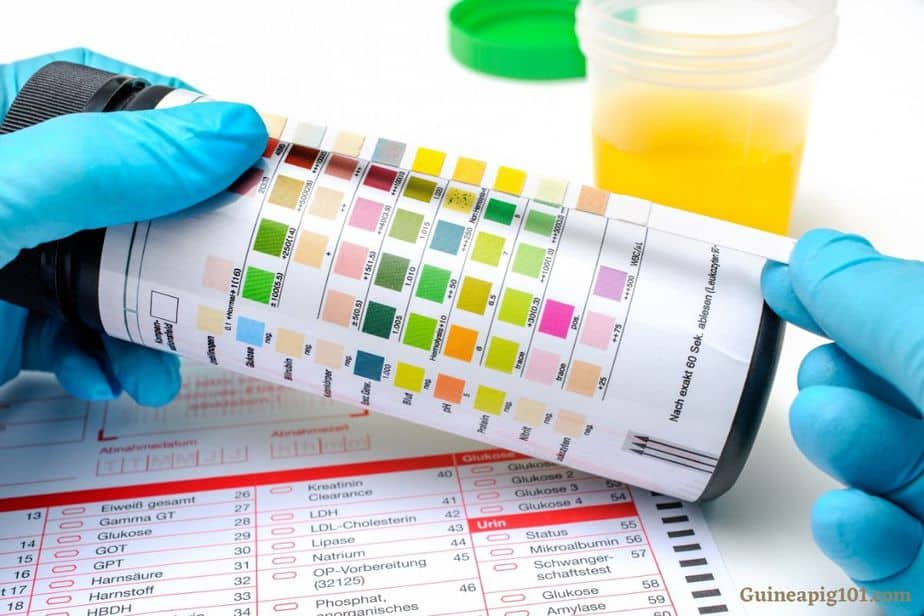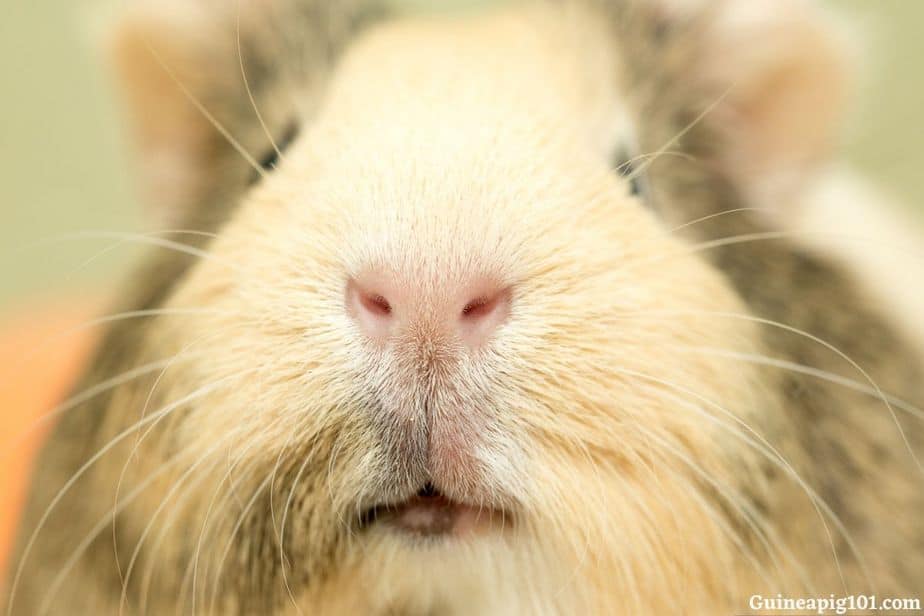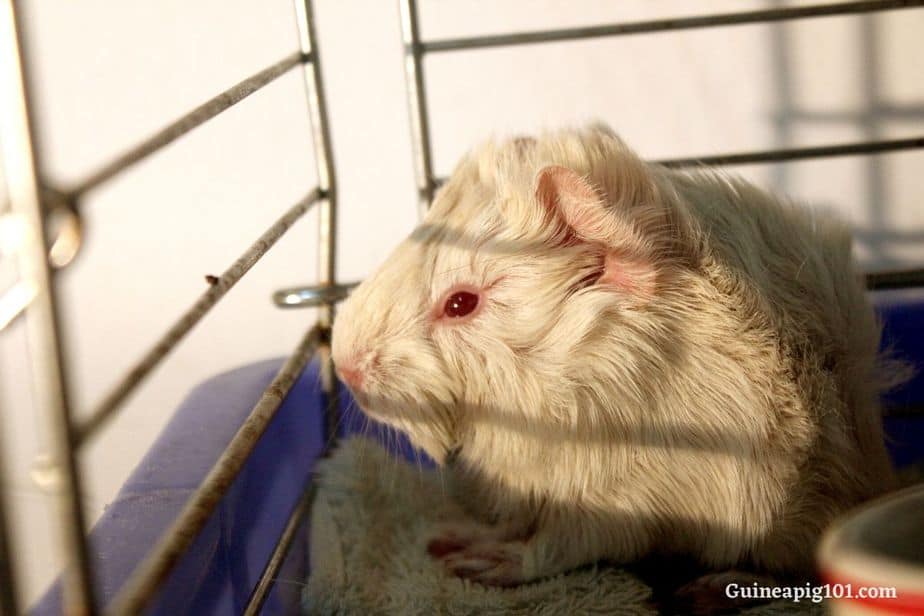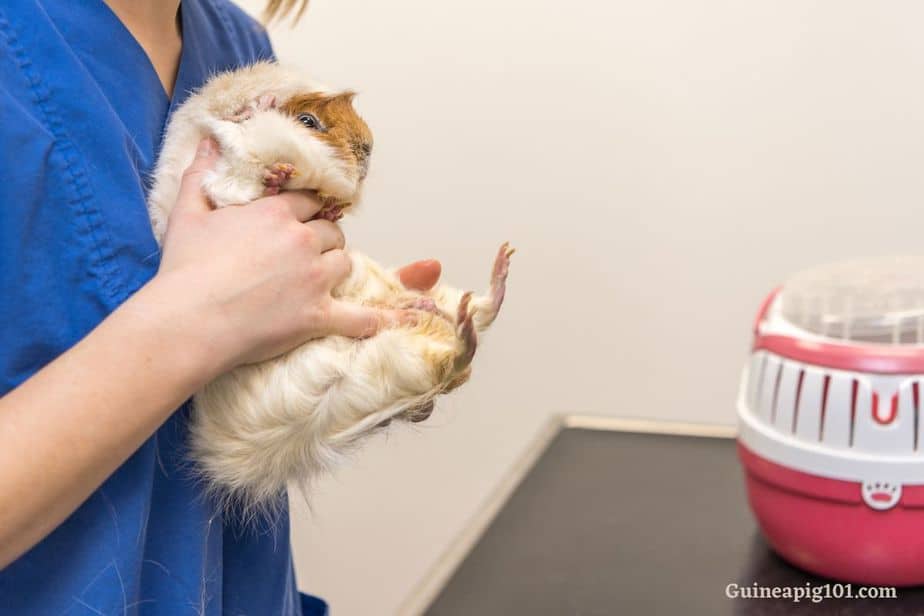Guinea pig’s bleeding can generally be treated. Some situations can be life-threatening, so it is essential to pay attention to your guinea pig’s physical state. There will be an internal problem if your guinea pig has blood in their urine, stools, or vaginal discharge, which needs to be examined immediately by a veterinary surgeon.
Some of the reasons in guinea pigs for bleeding include Epistaxis, Uroliths, reproductive tract dysfunction, Rectal prolapse, guinea pig hemorrhagic disease, bleeding after neutering, bladder stones, urinary infections, and tumor. Bleeding can also be caused by cutting your guinea pig’s nails too short.
Inflammation and bleeding are the most common causes of anemia in guinea pigs.
If you notice any signs of blood in your guinea pig’s enclosure or changes in your guinea pig’s behavior, proper blood tests can diagnose the cause of anemia and discover more about it.
8 Causes of blood loss in guinea pigs
Chronic conditions, infection, and trauma cause blood loss and can lead to difficulties or life-threatening if not treated early.
Pay close attention to the changes in your guinea pig’s behavior and any different signs:
Guinea pig blood in urine

Sometimes it doesn’t mean that the blood in your guinea pig’s urine could be arising from the urinary system.
The urethra opens along with the wall of the vagina in female guinea pigs.
That can cause certain substances in the vagina to mix up with the urine, which causes bleeding. For example:
- Uterine Adenocarcinoma: It is the most common tumor in guinea pigs. A cancerous injury that arises on the uterus, from which the urine gets bloody. The tumor rarely spreads. However, Surgery is the only treatment for this.
- Dysfunction of the reproductive tract: In virgin female guinea pigs, this is the most common cause of hematuria that is why guinea pigs need to be spayed. Causes include an increase of the uterine tumors and tissues, for example, adenocarcinoma.
Your veterinary surgeon may suggest a urine sample to perform a urinalysis and a dipstick test if you recognize anything uncommon in the urine of your guinea pig.
To collect your guinea pig’s urine, place your guinea pig in a washbasin after this, add some water in it. When your guinea pig pees, and collect the urine with the help of a syringe.
Symptoms of Hematuria
- Anorexia
- Abdominal pain on palpation
- Lethargy
- Frequent bruising from excessive clotting
- Development of tumor
- Perineal dermatitis
- Distended abdomen
- Enlarged bladder
- Difficulty urinating
- Weakness
Hematuria is a sign of pathology and not a situation by itself. It generally happens as a result of problems linked with the urinary area.
Also read: Red urine in guinea pigs (Causes+What to do)
Guinea pig bleeding from nose

Bleeding from the nose can occur only at one time in guinea pig or can be a recurring problem. This case is not either typical or common in guinea pigs.
Nose bleeding is a severe problem of guinea pigs that requires an immediate visit to the veterinary surgeon.
Periodic nose bleeding in guinea pigs can lead to aspiration, hypoxia, hypotension, and even life-threatening cardiovascular complications if this will not be treated earlier.
Signs of Epistaxis in guinea pigs
In addition to the nose bleeding, epistaxis may lead to the following symptoms and signs:
- Nasal discharge
- Appetite loss
- Sneezing
- Excessive tear production
- Black stools (from digested blood) if blood is wiped out.
- Excessive production of saliva.
- Blood in stools, urine, or other body parts, if there is hemorrhage.
- Bloodstains on the front paws
Causes of Epistaxis in guinea pigs
Those guinea pigs who have a weak immune system and live in unhygienic conditions have the nose bleeding problem. The following are some of the most common causes of nose bleeding in guinea pigs:
- Fungal or bacterial infection
- Tooth root blemish
- Blood clotting problems
- Injury to the teeth by chewing on electric cords
- Tumor in the nasal cavity or space-occupying growths
- Foreign body in the nose, such as inhaled vegetable matter (grass and seed)
Diagnosis of Epistaxis in guinea pigs
In guinea pigs, a wide range of fundamental problems can cause epistaxis. Thus, your veterinarian will conduct a detailed physical exam. The differential diagnosis will most probably be needed to determine the basic cause.
Your veterinarian will conduct a chemical blood profile and blood profile, including a blood count. If the essential clotting factors are available to stop the bleeding, then the blood clotting coagulation time will be suggested.
Limited clotting factors in the blood can cause hemorrhage and uncontrolled bleeding. Visible diagnostics include:
- The chest x-ray, for signs of cancer and respiratory system involvement.
- The cheekbones x-ray, and skull to analyze for growths, injuries, or tumors.
Your veterinarian will perform MRI, and CT scans to inspect for injuries or growths. Your veterinarian may conduct a biopsy on your guinea pig’s obtained samples or nasal tissues for bone marrow inspections if increases are found.
For the bacterial and fungal diseases, blood and fluid samples will also be examined.
Treatment of Epistaxis in guinea pigs
Symptoms can be treated early. Bleeding can be stopped by the medicines provided by your veterinary surgeon to increase the clotting before further problems arise.
If there is an infection, then antibiotics will be advisable. Also, the treatment will depend on the definitive diagnosis.
Guinea pig bleeding from mouth
Bleeding from the mouth can be a cause of various dental diseases. The most common disorder is malocclusion indicating improper teeth alignment.
Slobbers is another dental disease that occurs when a guinea pig’s teeth become overgrowth, making it difficult to chew. These dental diseases require immediate medical treatment.
Also read: How to keep guinea pig’s teeth short
Causes
Any discharge of blood in the guinea pig is not universal; this should be considered a severe problem.
The causes of bleeding from the mouth can be bladder stone, internal hemorrhaging, a dental problem, or by chewing the stiff wire.
Treatment
If your guinea pig shows bleeding in the mouth, immediately go to your veterinarian clinic.
Make sure your guinea pig has plenty of hay and grass to chew, unfiltered water, and get enough Vitamin C rich foods.
Guinea pig bleeding nail

An injured nail can result in irritation, pain, bleeding, and cause infection in some cases.
Sometimes you may also find that your guinea pig’s nails just fell without any injury or blood.
Any swelling or redness occurring within the first 48 hours in the feet of your guinea pig is a noticeable sign of bacterial infection.
Daily trim your guinea pig’s nails, as it is essential because your guinea pig will not be able to dig and wear down their nails on the floor of your house.
The nails grow curls and are too long inside your guinea pig’s feet or catch or tear on objects if it does not trim.
Also: Guinea pig nails broke off(Causes+What to do)
Causes of bleeding nail
Bleeding can be caused by cutting your guinea pig’s nails quickly or trimming them too short.
A vein that is located inside the guinea pig’s nail is known as quick. It is a delicate area, which can cause severe pain and bleed if it is injured.
They need to be treated, as it can cause infection. A common disease, named bumblefoot, occurs when your guinea pig’s nail bed is exposed to wet flooring for an extended period.
Treatment of bleeding nail
- You can use the nail clippers, which are designed for animals.
- Applying styptic powder can help to stop the bleeding of your guinea pig nails.
- Flour can also be used instead of cryptic powder.
- Try to press the nail into a soap bar.
- Simply apply the pressure to the nail tip, which can be useful for minor bleeding.
Guinea pig bleeding from anus
Any growth or bleeding in your guinea pig’s anal or bottom area, go to the veterinary’s office immediately.
Understanding issues with the anus can make you prepare if you notice any different signs, such as blood on the floor, straining in the litter box, and mass sticking out from your guinea pig’s back end.
Polyps
The most common problems of the anus are polyps, where excessive growth of the mucous membrane in the rectum sticks through the anal opening.
The most common sign of anal polyps is bleeding from the anus. Even though polyps are not harmful in effect, there is a chance that one may grow very large to block the rectum. To treat this type of case, surgical removal is the only option.
Anal polyps may seem to be red, brown, and pink due to inflammation in anal or rectal tissue.
The change in the texture and shape of its stool is due to less fiber in the diet of guinea pig, leading to inflammation of the delicate tissue in the anus and rectum.
Numerous polyps may cause feces to come out from in between them. You will only have to scan the condition carefully if there is no blockage in the anal or pain in the anal. If the polyps cause pain or blocking the passage of stool, then surgery is essential.
Also read: GI stasis in guinea pigs
Papillomas
A papilloma is tiny, and many times are not a harmful tumor of the skin. Papillomas usually bleed easily, and the color of them are white or pink.
A papilloma will formulate at the intersection of rectoanal and stick out from the anus.
It can be challenging to identify a papilloma when it is tiny unless pressure is applied or when stool is being passed out. Papillomas become more noticeable as they grow and start to stick out.
Papillomas can get crusty and develop into or become affected by an ulcer. They can also grow huge to stop the anus.
It is caused by the Shope papillomavirus and generally stuck out. However, the virus may cause a harmful growth in some pet guinea pigs; hence this requires surgical reduction.
Hemorrhoids
Though it is difficult to differentiate between two of them, the polyp is made up of solid matter, whereas a hemorrhoid is filled with blood, provoked by the rectum or anus.
Hemorrhoids occur as a result of extra pressure on the vein, which can be overcome by using heavy anti-inflammatory medication.
Hemorrhoids are rare in guinea pigs, and most of the time, they are small.
They do not cause much swelling to block the anus and, most of the time, resolve on their own. However, they will have to be surgically removed if they become large enough.
Syphilis
The bacterium, Treponema cuniculi, and lesions that appear similar to papillomas are the causes of syphilis in guinea pigs.
Though, syphilis lesions are provoked areas of tissue around the mucocutaneous junction of the anal opening, also the eyes, lips, nose, and the urogenital regions of a guinea pig.
Lesions may appear raised and crusty during the early stages of the disease. As the situation proceeds, they formulate into large papillary nodules that develop into or become affected by an ulcer and bleed.
Guinea pig bleeding after neutering

Following neutering, most of the male guinea pigs return to normal behavior or health.
Though, there are some cases where the remaining scrotal sac fills with blood. Also, this can cause the scrotum to become purple and enlarged.
It is not always harmful to your guinea pig as you can see the blood leaking into the scrotal sacs because of the incomplete cauterization of the vessels.
Your veterinary surgeon may recommend soothing your guinea pig and applying a cold pack to the affected area until the internal bleeding stops.
To make sure your guinea pig’s stitches are not coming out or are being pulled by your guinea pig, check them regularly.
If you notice any signs of external bleeding or if your guinea pig has been pulling at its stitches, immediately call your veterinary surgeon.
Guinea pig bleeding from nipple
Bleeding from the nipple can be a severe disease. Guinea pigs contain a single pair of mammary glands in the groin area.
These two glands do not supply blood or lymph. As blood from the nipple can be the symptoms of infectious diseases. Bloody discharge occurs very rarely in childhood.
Causes of bleeding nipple
Breast cancer, the bladder stones, mastitis, tumor, and inflammation can be bleeding from the nipple.
Treatment of bleeding nipple
The discharge from the nipple is commonly determined without apparent external cause, and ultrasonography is a beneficial diagnostic technique to inspect the purpose of the discharge from the nipple.
An X-ray will also help determine the cause.
Guinea pig bleeding eye
Infections can cause bleeding eyes of guinea pigs. Especially in guinea pigs, dental problems can also cause eye problems.
Some of the guinea pigs’ eyeballs look blue and bloody.
Also read: Red eye in guinea pigs (what you must know)
Causes of bleeding eye
Conjunctivitis is usually activated by an irritant, allergic, or infectious problem, which causes pink or red guinea pigs’ eyes.
Different kinds of bacteria are also involved in streptococcal, Pasteurella, salmonella, chlamydophila, and listeria. This disease can be caused by unhygienic enclosure and urinary ammonia in the bedding.
The bloody eyes can also be caused by the other guinea pig who lives in the same enclosure.
Treatment of bleeding eye
To treat this infection, antibiotic eye drops and oral antibiotics are advisable to control this infection.
Safely wrap your guinea pig in the towel, and putting the eye drops is the easy way to attempt this. Or else, you can take your guinea pig to the veterinarian office.
Your veterinary surgeon will clean the area affected and remove the discharge by giving it a light antiseptic eyewash before applying the eye drops.
Also read: Eye booger in guinea pigs
Conclusion

Bleeding in guinea pigs is a severe issue but can be treated. There are many reasons for bleeding in the guinea pig, such as blood in urine, nose bleeding, anal bleeding, trimming nails too shot, mouth bleeding, anus bleeding, nipple bleeding, bleeding after neutering, and eye bleeding.
The causes of blood loss in guinea pigs are caused by trauma, infection, and chronic diseases, which is very complicated.
There are eight causes of blood loss in guinea pigs. The first one is guinea pig blood in urine, which is caused by dysfunction of the reproductive area and Uterine Adenocarcinoma.
The second one is bleeding from the guinea pig’s nose, which is a severe issue, caused by a weak immune system and unhygienic living conditions.
Bleeding nose causes blood clotting problems, tumors, tooth root scar, fungal infection, etc., and can be treated by antibiotics, suggested by your veterinarian.
The third is mouth bleeding caused by the dental problem and can be treated by a veterinary surgeon.
Nail bleeding is the fourth cause which can be treated by applying styptic powder.
The fifth is bleeding from the anus, for example, polyps, papilloma, Hemorrhoids, and Syphilis, which cause bleeding infection.
The sixth one is suffering after neutering, which is not always harmful to your guinea pig and can be treated by applying a cold pack to stop the bleeding.
Bleeding from the nipple is the seventh cause, which needs to be addressed immediately as this causes severe infection.
The last one is suffering from the eye, which can be caused by unhygienic enclosure and urinary ammonia in the sleeping area. Oral antibiotics and antibiotic eye drops are suggested to prevent this infection.
Source: MSD VET MANUAL, Sawneeanimalclinic, Urine sampling, Composition, and characteristics of urinary calculi from guinea pigs, Cystitis, urolithiasis, and cystic calculi in aging guinea pigs.
Similar Posts:
- Guinea Pig Nail Broke Off? (Injured, Ripped off, Fell Off & Recovery)
- Bumblefoot in Guinea Pigs (Pododermatitis): Causes, Signs & Treatment
- Red Urine In Guinea Pigs: Here Is What You Should Know!
- Do Guinea Pigs Have Periods? (Guinea Pig Bleeding From Her Bottom)
- Do Guinea Pigs Need Shots? Guinea Pig Common Health Problems
